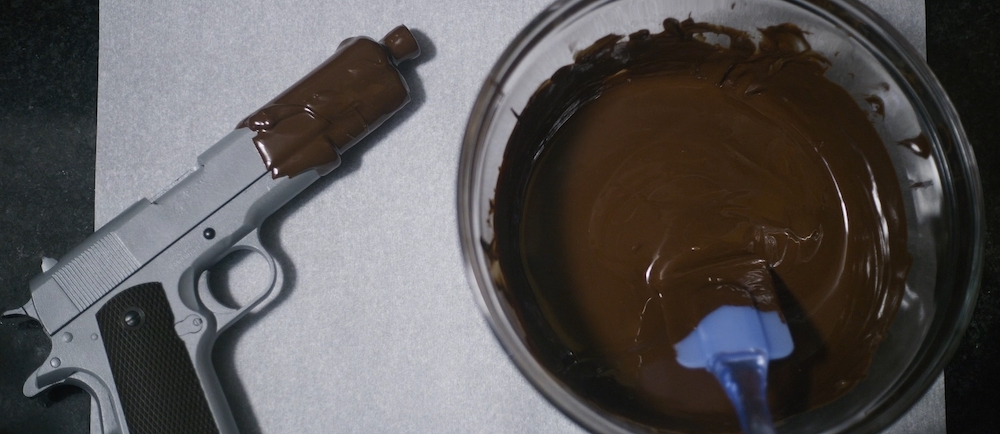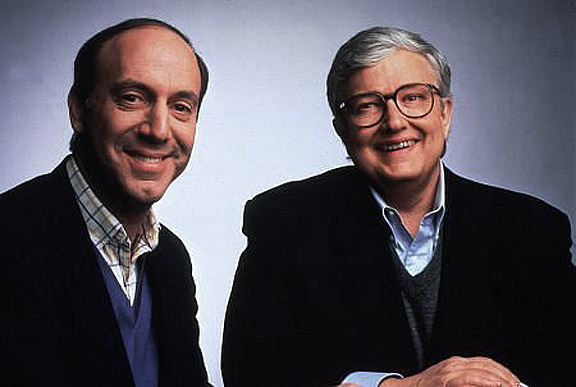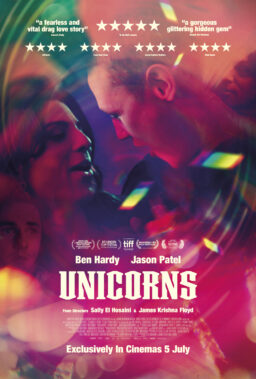Disclaimer: The following short film involves a firearm.
It might take you longer to read this review than to watch Will Goss’s latest short film, “Sweet Steel,” but the film’s impact might last longer than anticipated. You should really watch the film first and then come back here and read the review and Q&A (I recommend that for all these columns, of course, but especially here). In order for the ending to be felt, this review will have to be shorter than usual so as not to spoil anything.
It involves a man (John Merriman) with a plan. That plan involves a gun, chocolate, and a rubber stopper. That is all you should know and even that feels like too much. At just under five minutes, Goss tells an entirely visual story that effortlessly achieves fluid tonal shifts from tragic to comic to devastating sadness and hope. It is incredibly simple and yet, even though you do not know this person’s inner turmoil and don’t even really see his face until later, you get the sense of a person outside himself, going through the motions of a plan that appears strangely humorous upon first viewing. Goss could have ended on a darkly comic note, but wisely chooses to play it straight.
“Sweet Steel” played many festivals, including SXSW and the Chicago Critics Film Festival. As the short film curator for the latter, I can say this is one of the most easily programmable films I’ve come across, not just because of the length, but because of how beautifully it condenses a singular human experience within the bare essentials of storytelling and knowing every viewer will be taken by it.

Q&A with writer/director Will Goss
How did this idea come about?
I was trying to come up with a more cost-effective concept for a new short film than the ideas I’d been kicking around at the time. Without a premise readily at hand, I decided to work backwards by determining the core of the stakes first. What would be dramatic enough to grab the viewer right out of the gate? A matter of life and death, which is pretty much as primal as it gets. What’s a life-or-death scenario that isn’t just some crime story? I remembered seeing “A Single Man” in 2009, and as Colin Firth’s grief-stricken protagonist goes about trying to plan the ideal way to kill himself and leave the most minimal mess, I was struck by the thought of how terrible it must be for the last sensation to go through one’s brain being a lament for the lousy taste of a gun barrel in one’s mouth. As someone who has then gone on to contend with similar thoughts over the past few years, it’s usually been easier to distract myself when times were tough with something relatively minute and take the proverbial scenic route to feeling better, even if it’s just a temporary reprieve, rather than lie around and wait for some impossible solution to present itself. So now we had a story about a guy whose life depended on distracting himself well enough for long enough to get the help that he can’t just come right out and ask for.
What kind of direction did you give to John Merriman for the final scene?
It was tough because we had to shoot that scene first and the preceding action is otherwise relegated to face-cropping close-ups, so it was critical to deliver the entire emotional payload that we’d hope to build to in the edit. People who struggle with severe depression are often told that they should always reach out to someone to get help, but there are plenty of ways to rationalize one’s self away from this ostensibly simple gesture and back into the fear of feeling like an undue burden on others. John and I discussed the fact that this guy has to reach a vital moment of connection that he couldn’t bring himself to initiate and just find himself overwhelmed by all of the emotions that he’d stowed away in order to dispassionately proceed with this odd chore of his. By the first take, John’s performance had the majority of our crew tearing up, myself included, so I knew then that we were going to make it work in the end.
Your films often come in at just under five minutes. Is that important to you when forming these projects?
Definitely. It’s as much a practical consideration of often limited time and resources as it is a response to years spent as alternately a film critic and a short film programming volunteer. If you’ve generally grabbed someone’s attention within the first minute, it’s not much of an ask for them to stick it out for the remaining four. Once you get past five minutes, the need to deliver a proportionally satisfying ending really tends to increase, and if you start to crack the teens, you are potentially forcing a festival programmer to choose between your relatively lengthy submission or two shorter films that could fit within that same block of time instead.

The film veers into comic territory and the ending could have carried that through, but you went the other direction. Was there any idea or temptation to go a different direction?
I can’t say that I ever had anything else in mind, even from the first draft. That didn’t stop a few friends from saying that they definitely expected some sort of gallows humor punchline from me, where one character or the other would accidentally bite it despite all good intentions. It still tickles me that the biggest twist I’ve pulled off to date was simply choosing to be sincere for a change, but honestly, it was more valuable for the story if we walked away on a note of hard-won, somewhat circuitously earned hope rather than tipping the tone into outright mawkishness or going as dark as possible with the ending.
What has the reaction to the film been like?
Remarkably supportive and really something of a relief. Nothing about this short on paper screams “crowd-pleaser,” and while that still might be too strong of a label for what we’ve made, I’ve been fortunate to attend nearly every fest screening since March and found it playing consistently funnier than I imagined it would. I enjoy dark comedies myself and don’t really have a problem with that response (hey, it’s better than booing). Admittedly, our approach to this subject matter was a bit left of center, but I felt we had to play things completely straight on set so nobody would ultimately come away thinking that we’d been glib about an immensely sensitive topic. If people happen to find this scenario amusing, they seem to be more easily lulled into the established editing rhythm and intentionally narrow worldview, hopefully making the climactic interruption more jarring and effective as a result.
What’s next for you?
I may try to cram in a new short this year in order to scratch that particular itch and keep up my annual production pace, but my attention has largely shifted to developing feature-length projects and seeing where things might go from there.












